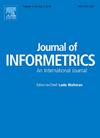Do male leading authors retract more articles than female leading authors?
IF 3.5
2区 管理学
Q2 COMPUTER SCIENCE, INTERDISCIPLINARY APPLICATIONS
引用次数: 0
Abstract
Scientific retractions reflect issues within the scientific record, arising from human error or misconduct. Although gender differences in retraction rates have been previously observed in various contexts, no comprehensive study has explored this issue across all fields of science. This study examines gender disparities in scientific misconduct or errors, specifically focusing on differences in retraction rates between male and female first authors in relation to their research productivity. Using a dataset comprising 11,622 retracted articles and 19,475,437 non-retracted articles from the Web of Science and Retraction Watch, we investigate gender differences in retraction rates from the perspectives of retraction reasons, subject fields, and countries. Our findings indicate that male first authors have higher retraction rates, particularly for scientific misconduct such as plagiarism, authorship disputes, ethical issues, duplication, and fabrication/falsification. No significant gender differences were found in retractions attributed to mistakes. Furthermore, male first authors experience significantly higher retraction rates in biomedical and health sciences, as well as in life and earth sciences, whereas female first authors have higher retraction rates in mathematics and computer science. Similar patterns are observed for corresponding authors. Understanding these gendered patterns of retraction may contribute to strategies aimed at reducing their prevalence.
男性主要作者是否比女性主要作者撤回更多的文章?
科学撤回反映了科学记录中的问题,由人为错误或不当行为引起。虽然先前已经在各种情况下观察到撤稿率的性别差异,但还没有全面的研究在所有科学领域探讨这个问题。本研究考察了科学不端行为或错误中的性别差异,特别关注了男性和女性第一作者在研究生产力方面的撤稿率差异。使用来自Web of Science和Retraction Watch的包含11,622篇撤稿文章和19,475,437篇未撤稿文章的数据集,我们从撤稿原因、学科领域和国家的角度调查了撤稿率的性别差异。我们的研究结果表明,男性第一作者的撤稿率更高,特别是在科学不端行为方面,如抄袭、作者争议、伦理问题、重复和伪造/伪造。在错误导致的撤稿中,没有发现显著的性别差异。此外,男性第一作者在生物医学和健康科学以及生命和地球科学领域的论文撤稿率要高得多,而女性第一作者在数学和计算机科学领域的论文撤稿率要高得多。通信作者也观察到类似的模式。了解这些撤稿的性别模式可能有助于制定旨在减少撤稿发生率的策略。
本文章由计算机程序翻译,如有差异,请以英文原文为准。
求助全文
约1分钟内获得全文
求助全文
来源期刊

Journal of Informetrics
Social Sciences-Library and Information Sciences
CiteScore
6.40
自引率
16.20%
发文量
95
期刊介绍:
Journal of Informetrics (JOI) publishes rigorous high-quality research on quantitative aspects of information science. The main focus of the journal is on topics in bibliometrics, scientometrics, webometrics, patentometrics, altmetrics and research evaluation. Contributions studying informetric problems using methods from other quantitative fields, such as mathematics, statistics, computer science, economics and econometrics, and network science, are especially encouraged. JOI publishes both theoretical and empirical work. In general, case studies, for instance a bibliometric analysis focusing on a specific research field or a specific country, are not considered suitable for publication in JOI, unless they contain innovative methodological elements.
 求助内容:
求助内容: 应助结果提醒方式:
应助结果提醒方式:


